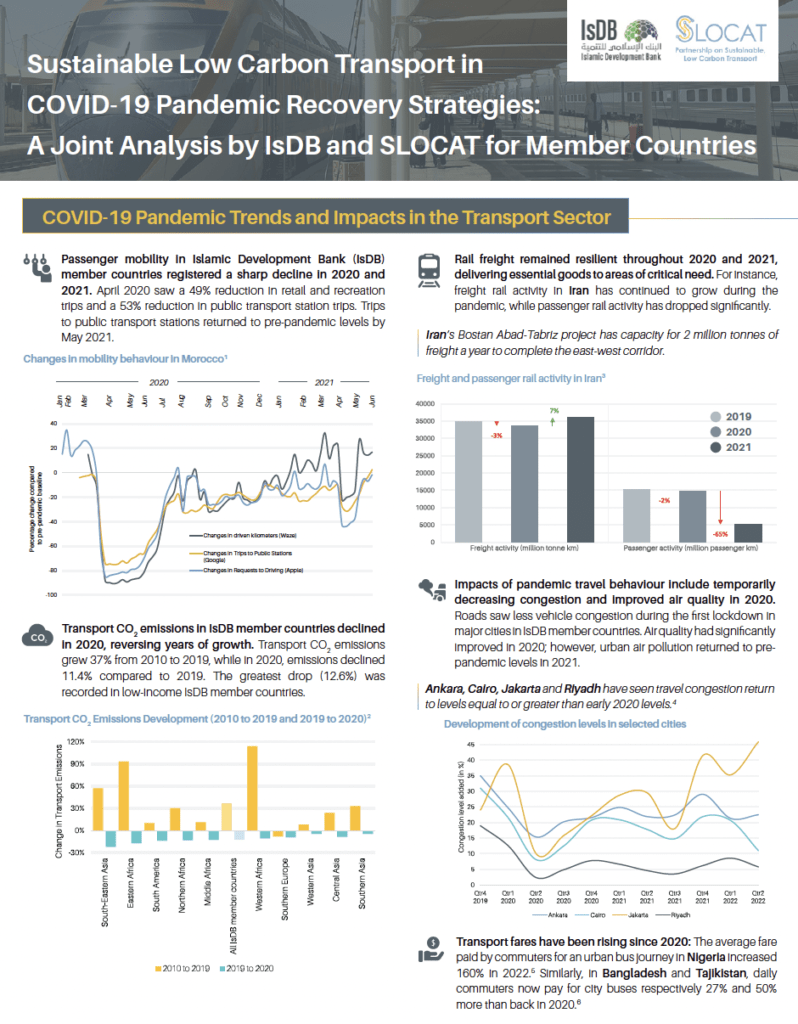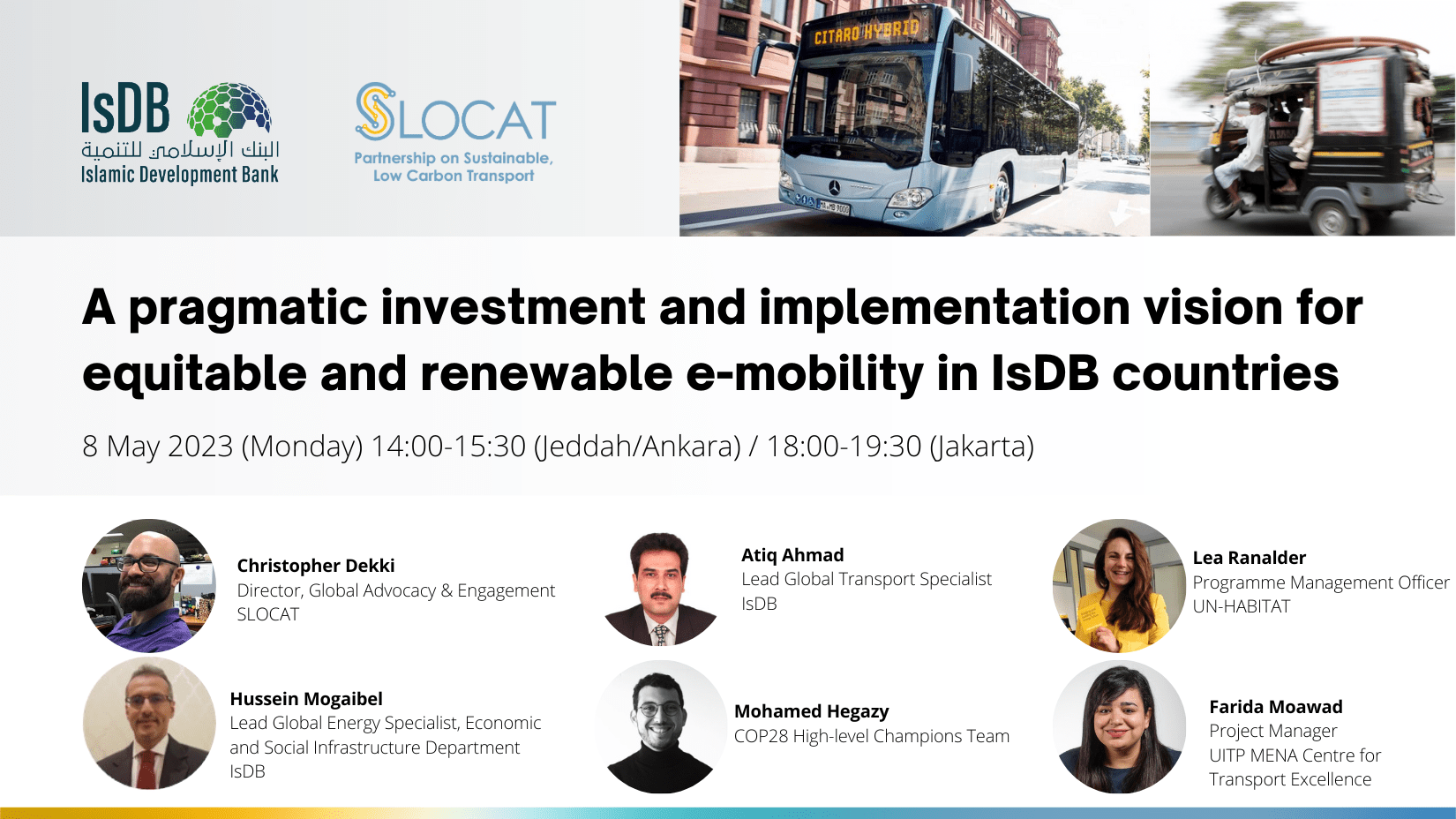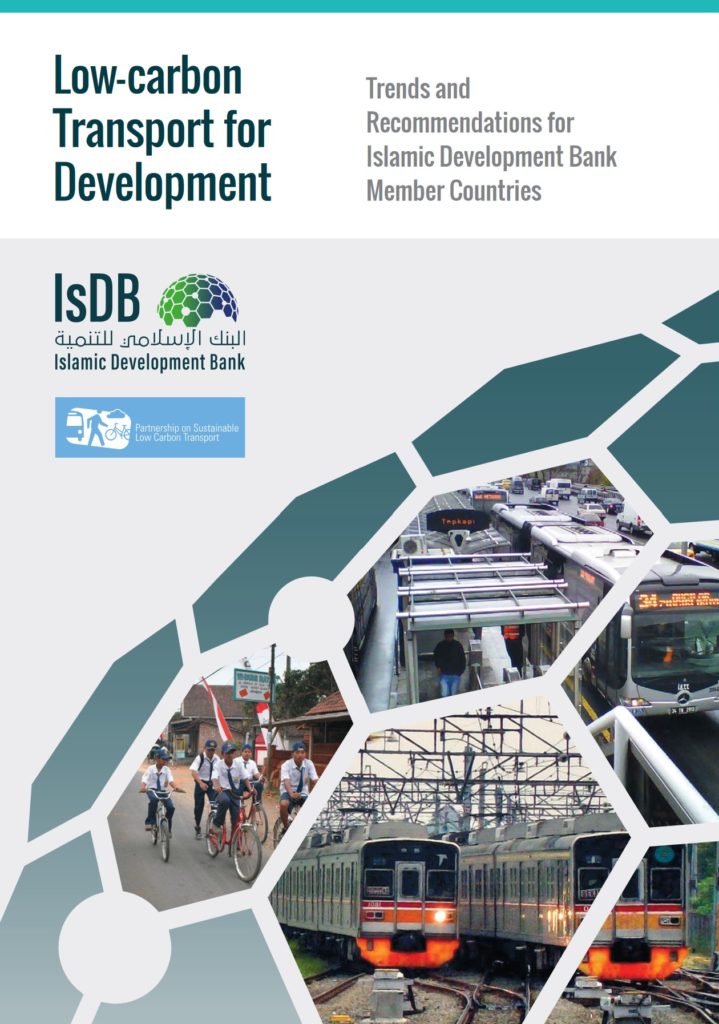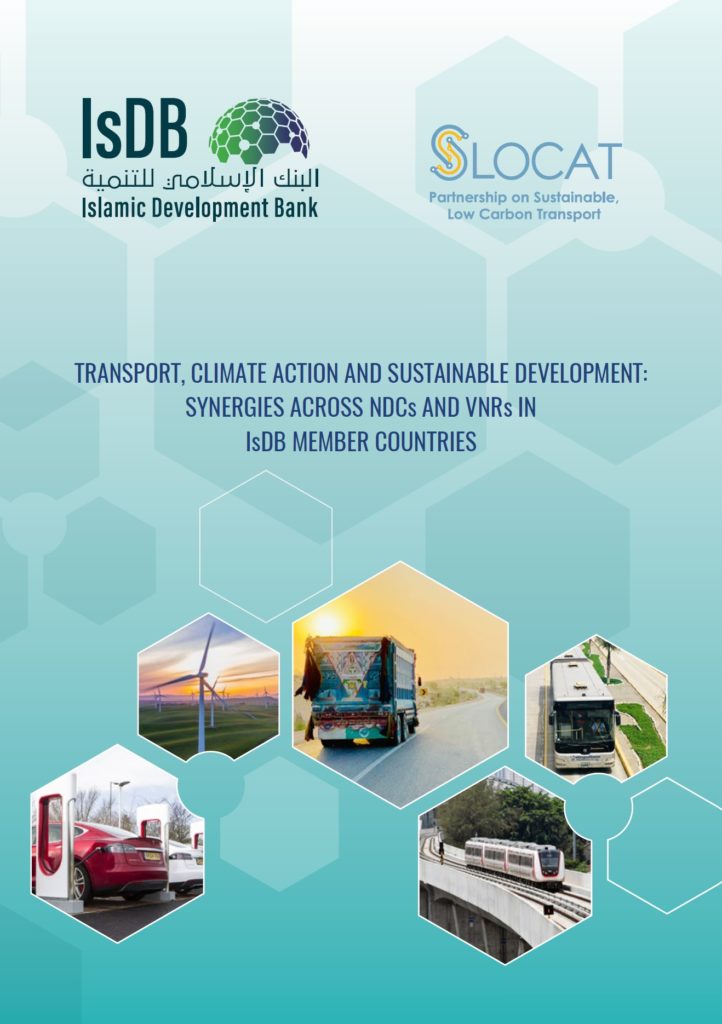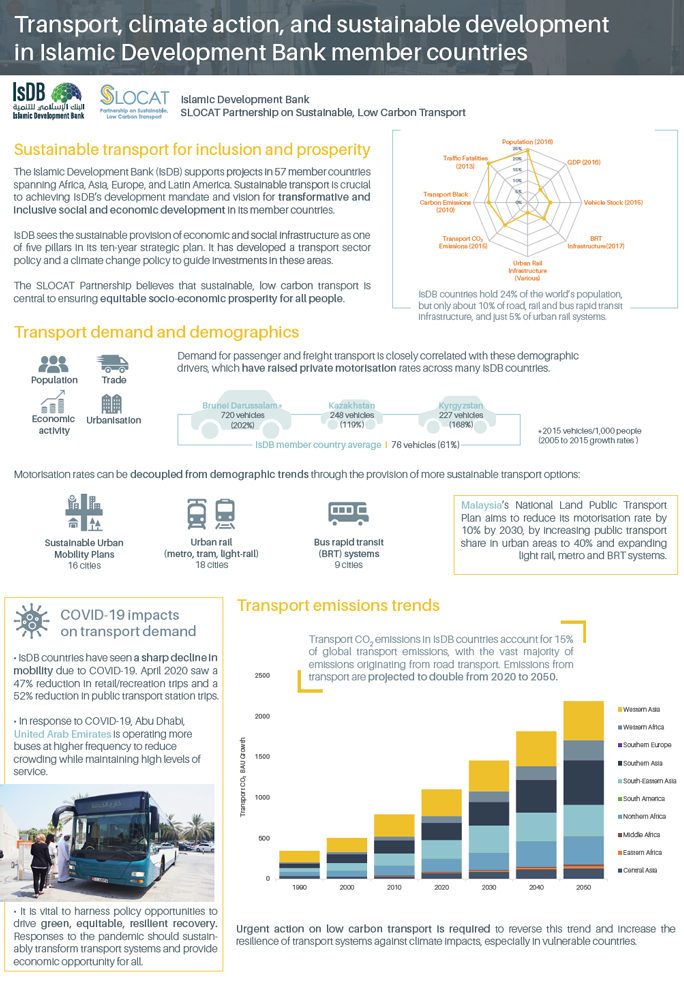
Collaborations with Islamic Development Bank
Overview
The Islamic Development Bank (IsDB) and the SLOCAT Partnership on Sustainable, Low Carbon Transport are engaged in a multi-phase research collaboration on transport and climate change in IsDB member countries. IsDB maintains a portfolio of projects in 57 member countries across four continents, several climate zones and ten sub-regions in Northern Africa, Sub-Saharan Africa, West, Central, South and Southeast Asia, and (to a lesser extent) Europe and Latin America. Transport accounted in 2016 for USD 1.7 billion out of USD 3.5 billion for infrastructure financing by IsDB and 46% of that is spent for rail, 44% for road and 10% for urban mass transit.
IsDB member countries face a number of challenges, including rapid urbanisation, rising motorisation rates, growing greenhouse gas emissions, climate change vulnerabilities, upstream capacity constraints and limited pipelines for infrastructure projects.
This issue brief illustrates impacts of the COVID-19 pandemic on mobility in IsDB sub-regions and the role of sustainable transport towards a green, equitable and resilient recovery. The analysis was informed by the SLOCAT-IsDB think tank session at the 2022 Middle East and North Africa Climate Week, which discussed how social and economic recovery and resilience can be accelerated through increased investment in public, shared and active transport.
A Pragmatic Investment and Implementation Vision for Equitable and
Renewable E-mobility in IsDB Countries
This side event, organised at the IsDB Annual Meeting 2023, broadened discussion of transport electrification in IsDB member countries to integrate the topics of just transition, renewable energy and South-South cooperation to maximise the impacts of e-mobility. The session gathered inputs for a planned issues brief on efficient and equitable e-mobility in IsDB countries, to identify from participants challenges and opportunities for scaling up equitable e-mobility through global best practices.
Low-Carbon Transport for Development: Trends and Recommendations
The Report on Low-carbon Transport for Development describes major challenges and needs, potential policy activities and areas of required action related to transport and climate change in IsDB member countries.
This report addresses the needs and challenges described through seven areas of analysis with supporting trends, best practices and recommended actions:
Transport drivers and demand
The projected growth in motorisation in IsDB MCs must be aggressively countered with a balanced set of measures to stabilise and reduce car ownership and use.
Transport emissions
Rising emissions across IsDB sub-regions must be coupled with broad and balanced investments in low-carbon mobility options which bring significant and more equitable long-term, economy-wide benefits.
Mitigation policy responses
To make a proportional contribution to Paris Agreement targets, more ambitious mitigation action is needed for transport in IsDB MCs.
Adaptation policy responses
Adaptation and resilience measures must be mainstreamed in transport systems, as the infrastructure and services of most IsDB MCs are highly vulnerable to the impacts of climate change, especially in low-income countries and coastal/island states.
Urban Transport
Investments in urban mass transit in IsDB MCs must be accelerated to keep pace with the projected growth in urbanisation.
Passenger and freight transport
Sustainable freight transport requires further attention and investment in IsDB MCs, especially landlocked countries with high freight-to-passenger transport mode shares.
Road safety
The number of road traffic crashes in IsDB MCs is rising at alarming rates, and bold and rapid action is needed to increase road safety measures.
Transport, Climate Action and Sustainable Development: Synergies across Nationally Determined Contributions (NDCs) and Voluntary National Reviews (VNRs)
The transport sector has a critical role to play in achieving climate change mitigation targets and Sustainable Development Goals (SDGs), and the Paris Agreement on climate change and the 2030 Agenda for Sustainable Development provide a useful framework to help scale up sustainable transport measures. However, further alignment between these global processes is required to raise ambition and measure progress to realise the full potential of sustainable low-carbon transport in achieving these goals. This alignment is required both in the governance of the processes themselves and in the coordination among the national and sub-national actors formulating and putting them into practice.
A successful implementation of sustainable transport measures in the context of the Paris Agreement and the 2030 Agenda must involve concerted and coordinated efforts to more closely link the processes of developing, implementing and tracking progress toward NDCs and VNRs.
The report links mechanisms in the climate change and sustainable development frameworks with the objective to identify synergies for the development, implementation and reporting on sustainable transport for IsDB member countries. In conducting a detailed analysis of the transport dimension in a subset of IsDB countries’ NDCs and their VNRs – a mechanism to assess progress toward SDG goals and targets – the report addresses the following primary questions:
How can NDC and VNR development, implementation and reporting be optimised and leveraged to accelerate scale-up of sustainable transport measures across IsDB subregions?
What gaps exist for sustainable transport in NDCs and VNRs among IsDB member countries, and what opportunities exist for more coordinated and efficient management of transport within these mechanisms?
What kind of guidance is needed for mainstreaming sustainable transport measures in NDCs and VNRs in a more structured and quantified manner?
Good Practices on Transport for Climate Action and Sustainable Development
IsDB and SLOCAT developed an infographic to summarise the major findings of the two reports “Low-Carbon Transport for Development” and “Transport, Climate Action and Sustainable Development“. It shows the current trends on transport demand, emissions, policy frameworks and actions aligned to Avoid-Shift-Improve framework. The NDC-VNR synergy guidance featured in the infographic shows how to mainstream, accelerate, and support policies.
An issues brief on good practices with a focus on Northwestern Africa is being developed. It takes a deep dive into activities on the ground that are linked to NDCs and VNRs and have been successfully implemented.
